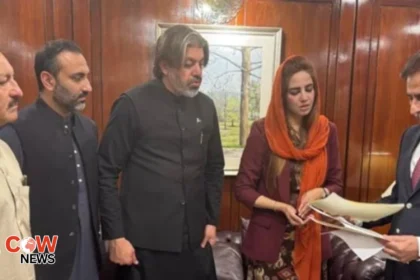Introduction
In a significant move towards revolutionizing education in the Sindh province of Pakistan, the provincial government has signed a Memorandum of Understanding (MoU) with tech giant Google. This partnership aims to leverage cutting-edge technology to enhance educational experiences and improve learning outcomes across various educational institutions in Sindh. The collaboration signifies a proactive approach to addressing the challenges faced by the educational sector in the province, particularly in the wake of the ongoing digital transformation in education worldwide.
In recent years, Pakistan has recognized the critical need to modernize its education system to better align with global standards and address the evolving demands of the job market. The partnership with Google is a testament to this recognition, as it signifies a commitment to harnessing technology to enhance the quality of education. With an ever-increasing emphasis on digital skills and competencies in various fields, this collaboration aims not only to improve the current educational framework but also to prepare future generations for the challenges and opportunities of a digital economy. As Sindh embarks on this transformative journey, the expectations are high for achieving significant milestones that could set a precedent for educational reforms across the country.
Background of the MoU
The MoU between the Sindh government and Google comes at a crucial time when the need for innovative educational solutions is more pressing than ever. The COVID-19 pandemic has exposed significant gaps in the education system, including inadequate access to quality education and limited resources for teachers and students alike. With a growing emphasis on digital literacy and the integration of technology in classrooms, this partnership represents a vital step towards enhancing educational infrastructure and making quality education accessible to all.
The signing of the MoU took place in the presence of key stakeholders, including provincial education officials and representatives from Google. The agreement outlines a framework for collaboration in various areas, including curriculum development, teacher training, and the provision of digital tools and resources. The partnership aims to foster an environment conducive to learning, innovation, and creativity, ultimately equipping students with the necessary skills to thrive in an increasingly competitive world.
Objectives of the Partnership
The partnership between Sindh and Google seeks to achieve several key objectives:
1. Enhancing Digital Literacy: One of the primary goals of the MoU is to improve digital literacy among students and teachers. By providing access to Google’s educational tools and resources, the Sindh government aims to empower educators and students to effectively utilize technology in their learning processes.
2. Curriculum Development: The collaboration will focus on developing a modernized curriculum that incorporates technology and prepares students for the demands of the 21st century. This includes integrating STEM (Science, Technology, Engineering, and Mathematics) education and fostering critical thinking and problem-solving skills.
3. Teacher Training and Development: Recognizing the pivotal role teachers play in the educational process, the MoU emphasizes the importance of professional development. Google will provide training and resources to enhance teachers’ skills, enabling them to effectively integrate technology into their classrooms.
4. Access to Digital Resources: The partnership will facilitate access to a wide range of digital resources, including online learning platforms, educational apps, and collaborative tools. This access will enable students to engage in self-directed learning and explore new subjects beyond the traditional classroom setting.
5. Promoting Innovation and Creativity: By fostering a culture of innovation, the Sindh government aims to inspire students to think creatively and develop solutions to real-world problems. The collaboration with Google will provide opportunities for students to participate in projects and initiatives that promote innovation.
Implications for Education in Sindh
The MoU between Sindh and Google holds several implications for the educational landscape in the province:
1. Increased Access to Quality Education: By leveraging technology, the partnership aims to bridge the educational divide and provide access to quality education for students in remote and underserved areas. This inclusivity is crucial for ensuring that all students have equal opportunities to succeed.
2. Improved Learning Outcomes: The integration of technology in education has the potential to enhance learning outcomes. By utilizing digital tools and resources, students can engage in interactive learning experiences that cater to their individual learning styles and preferences.
3. Empowered Educators: The focus on teacher training and development will empower educators to adopt innovative teaching methods and effectively integrate technology into their classrooms. This empowerment is essential for fostering a positive learning environment.
4. Alignment with Global Standards: The collaboration with a global leader in technology like Google positions Sindh’s education system on a path towards alignment with international educational standards. This alignment is vital for preparing students to compete in a globalized world.
5. Fostering a Culture of Lifelong Learning: The emphasis on digital literacy and access to online resources encourages a culture of lifelong learning. Students will be equipped with the skills needed to adapt to a rapidly changing world, promoting continuous personal and professional development.
Challenges Ahead
While the MoU presents numerous opportunities for enhancing education in Sindh, several challenges may arise during the implementation phase:
1. Infrastructure Limitations: One of the significant challenges is the existing infrastructure in many schools, particularly in rural areas. The lack of reliable internet access and modern technological resources may hinder the effective integration of digital tools in classrooms.
2. Resistance to Change: Change can often be met with resistance, especially in traditional educational settings. It will be crucial to address concerns and provide adequate support to educators and administrators to embrace the new technology and teaching methods.
3. Sustainability of Initiatives: Ensuring the sustainability of the initiatives outlined in the MoU will be vital for long-term success. Ongoing support, funding, and resources will be necessary to maintain the momentum of the partnership.
4. Training and Capacity Building: The effectiveness of the partnership will largely depend on the successful training of teachers and educators. Ensuring that all educators receive adequate training and support is essential for maximizing the benefits of the collaboration.
5. Monitoring and Evaluation: Establishing robust monitoring and evaluation mechanisms will be critical for assessing the impact of the partnership on educational outcomes. Continuous feedback and assessment will help refine strategies and ensure that objectives are met.
Future Prospects
The signing of the MoU between the Sindh government and Google marks the beginning of a new chapter in the province’s educational journey. With a shared commitment to innovation and quality education, both parties are poised to make a significant impact on the lives of students and educators.
As the partnership unfolds, it will be essential to maintain open communication and collaboration among all stakeholders involved. Regular updates, feedback, and assessments will contribute to the successful implementation of initiatives outlined in the MoU.
Furthermore, the Sindh government’s willingness to collaborate with a global technology leader like Google demonstrates a forward-thinking approach to education. By embracing technology and innovation, Sindh is taking meaningful steps towards creating a brighter future for its students and positioning itself as a leader in educational reform.
The signing of the MoU between Sindh and Google is a landmark development that underscores the importance of innovation in education. By leveraging technology to enhance learning outcomes, the partnership has the potential to transform the educational landscape in Sindh. As the implementation of initiatives progresses, it will be crucial to address challenges and ensure that the benefits of the collaboration reach all students and educators in the province. With a focus on digital literacy, curriculum development, and teacher training, the Sindh government is taking bold steps towards building a brighter future for education in the region.
#SindhEducation #GooglePartnership #InnovativeLearning #DigitalLiteracy #EducationReform #Pakistan #SindhGoogleMoU #21stCenturySkills #STEMEducation #TeacherTraining







